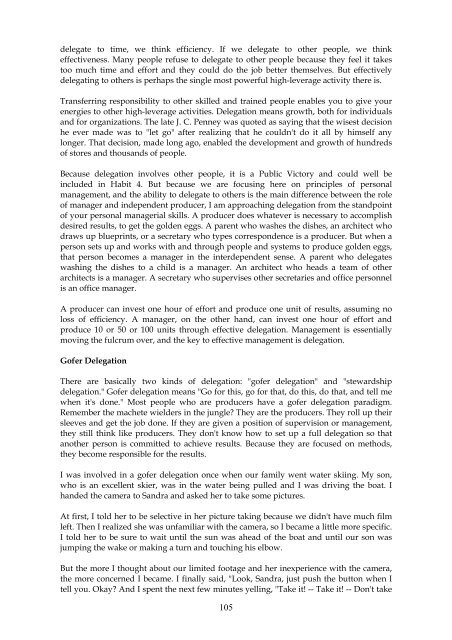Covey - The 7 habits of highly effective people
You also want an ePaper? Increase the reach of your titles
YUMPU automatically turns print PDFs into web optimized ePapers that Google loves.
delegate to time, we think efficiency. If we delegate to other <strong>people</strong>, we think<br />
<strong>effective</strong>ness. Many <strong>people</strong> refuse to delegate to other <strong>people</strong> because they feel it takes<br />
too much time and effort and they could do the job better themselves. But <strong>effective</strong>ly<br />
delegating to others is perhaps the single most powerful high-leverage activity there is.<br />
Transferring responsibility to other skilled and trained <strong>people</strong> enables you to give your<br />
energies to other high-leverage activities. Delegation means growth, both for individuals<br />
and for organizations. <strong>The</strong> late J. C. Penney was quoted as saying that the wisest decision<br />
he ever made was to "let go" after realizing that he couldn't do it all by himself any<br />
longer. That decision, made long ago, enabled the development and growth <strong>of</strong> hundreds<br />
<strong>of</strong> stores and thousands <strong>of</strong> <strong>people</strong>.<br />
Because delegation involves other <strong>people</strong>, it is a Public Victory and could well be<br />
included in Habit 4. But because we are focusing here on principles <strong>of</strong> personal<br />
management, and the ability to delegate to others is the main difference between the role<br />
<strong>of</strong> manager and independent producer, I am approaching delegation from the standpoint<br />
<strong>of</strong> your personal managerial skills. A producer does whatever is necessary to accomplish<br />
desired results, to get the golden eggs. A parent who washes the dishes, an architect who<br />
draws up blueprints, or a secretary who types correspondence is a producer. But when a<br />
person sets up and works with and through <strong>people</strong> and systems to produce golden eggs,<br />
that person becomes a manager in the interdependent sense. A parent who delegates<br />
washing the dishes to a child is a manager. An architect who heads a team <strong>of</strong> other<br />
architects is a manager. A secretary who supervises other secretaries and <strong>of</strong>fice personnel<br />
is an <strong>of</strong>fice manager.<br />
A producer can invest one hour <strong>of</strong> effort and produce one unit <strong>of</strong> results, assuming no<br />
loss <strong>of</strong> efficiency. A manager, on the other hand, can invest one hour <strong>of</strong> effort and<br />
produce 10 or 50 or 100 units through <strong>effective</strong> delegation. Management is essentially<br />
moving the fulcrum over, and the key to <strong>effective</strong> management is delegation.<br />
G<strong>of</strong>er Delegation<br />
<strong>The</strong>re are basically two kinds <strong>of</strong> delegation: "g<strong>of</strong>er delegation" and "stewardship<br />
delegation." G<strong>of</strong>er delegation means "Go for this, go for that, do this, do that, and tell me<br />
when it's done." Most <strong>people</strong> who are producers have a g<strong>of</strong>er delegation paradigm.<br />
Remember the machete wielders in the jungle? <strong>The</strong>y are the producers. <strong>The</strong>y roll up their<br />
sleeves and get the job done. If they are given a position <strong>of</strong> supervision or management,<br />
they still think like producers. <strong>The</strong>y don't know how to set up a full delegation so that<br />
another person is committed to achieve results. Because they are focused on methods,<br />
they become responsible for the results.<br />
I was involved in a g<strong>of</strong>er delegation once when our family went water skiing. My son,<br />
who is an excellent skier, was in the water being pulled and I was driving the boat. I<br />
handed the camera to Sandra and asked her to take some pictures.<br />
At first, I told her to be selective in her picture taking because we didn't have much film<br />
left. <strong>The</strong>n I realized she was unfamiliar with the camera, so I became a little more specific.<br />
I told her to be sure to wait until the sun was ahead <strong>of</strong> the boat and until our son was<br />
jumping the wake or making a turn and touching his elbow.<br />
But the more I thought about our limited footage and her inexperience with the camera,<br />
the more concerned I became. I finally said, "Look, Sandra, just push the button when I<br />
tell you. Okay? And I spent the next few minutes yelling, "Take it! -- Take it! -- Don't take<br />
105


